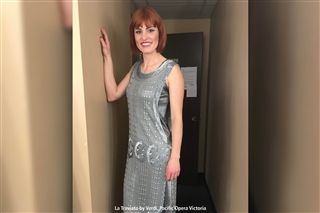I applied for the grant and have used it for my own voice lessons. These lessons continually build my vocal and musical skills, making me a better music teacher while also demonstrating that good teachers are good students too!
Singing can be an amazing tool to help students gain confidence, grow in creativity, build music appreciation and improve communication skills. When you perform in a choir, you are accountable to yourself and the group. Recently, we had a graduate who is a testament to the power of song. Akira came to GNS as a Japanese international student in Grade 11, and was shy and reserved. He joined choir because he was interested in singing, but didn’t really want to continue after a month, hoping to play drums in a rock band instead. I encouraged him to stick it out, and by the end of the Fall Term, he loved choir. Akira loved what we were singing, grew passionate about music, and was evolving into a self-assured performer and student.
This was the year that COVID hit—2019/2020. Akira flew back to Japan, but I continued to coach him one-on-one through Google Meet. When he returned the following September, I encouraged him to take voice lessons with a colleague. Whenever I ask a student to take voice lessons, it’s not because they can’t sing, it’s because I see a passion in them that I want to foster. There was immediate growth in his foundational skills: proper breath support, rounded tone, projection, and vowel shape. I invited Akira to sing a solo at graduation, and the reaction from the audience was incredible—all his peers stood and gave him a standing ovation. If you had told me this shy kid from two years ago would be on the stage singing for his peers, I would never have believed you. I was proud of him, and he was proud of himself. By allowing Akira to be vulnerable in his learning, and supporting his passion, he grew confident in himself, and was able to share his gift with others. His academic performance improved at the same time. This connection of allowing students to be vulnerable and nurturing their growth, exists in all subject fields of education.
With the support of GNS, I am able to continually grow my vocal skills and teaching methods which are transferable to my students. Some basic techniques of singing include resonance and buzz, head and chest voice, passagio (the transition between registers while singing), breath support and diaphragm control. I work a lot with changing voices in Middle and Senior School. Boys’ voices drop as they hit puberty and I support them through this awkward change, so they still have the confidence to sing and explore their new register. It is a surprise to some that girls’ voices also drop and my challenge is to help girls adjust to this new stage of their development and keep singing.
Your whole body is the instrument when you’re singing. It’s one of the hardest instruments to learn because you can’t see inside while singing. You can look inside a piano, and see how the hammers are hitting the strings to make sound vibrate, but I can’t look inside my body as I’m singing. I can look at photos of my vocal chords, and diaphragm muscles, but it’s a lot of “mind work” to imagine what’s happening in my body and what adjustments I need to make.
The other part of singing is, of course, music. There is so much great repertoire to choose from, and it is ideal to have a style or favourite composers that best fit your voice. I sing a variety of genres, but I am mainly trained as a classical singer. I speak English and French but I sing in many different languages, using the International Phonetic Alphabet. This helps singers understand universal vowel sounds, symbols and shapes. Vowels are important when singing—you can’t make pitch on consonants, you can only sing words on vowels. Having a strong base in music theory and understanding the role of accompaniment is vital too.
A commitment to continual learning through my voice lessons, and the discipline of practice outside of lessons, is a powerful example to students. My continuing music education allows me to perform in Pacific Opera Victoria (we perform Carmen by Bizet in October) and the Vancouver Island Chamber Choir, where I am also the President. I have also started a Staff Choir at GNS—there may be a news highlight about this endeavour soon! I try to demonstrate to students that music, especially choral music in a group setting, can be the source of life-long joy. For me, an example where this is exemplified is opera; where music, storytelling and theatre come together.
I encourage everyone to seek out music within our community; there is so much in Victoria! We’re privileged to live in a city that has a rich arts culture—it is full of talented musicians, actors, dancers, and all types of performers. Supporting your local venues and concerts directly supports the arts, and individual artists.
I am grateful to GNS for giving me the opportunity to teach singing as a profession and investing in my professional development through voice lessons. Singing enriches the soul of every singer, and the soul of every community that embraces it. As American composer Stephen Sondheim said, “If I cannot fly, let me sing.”





